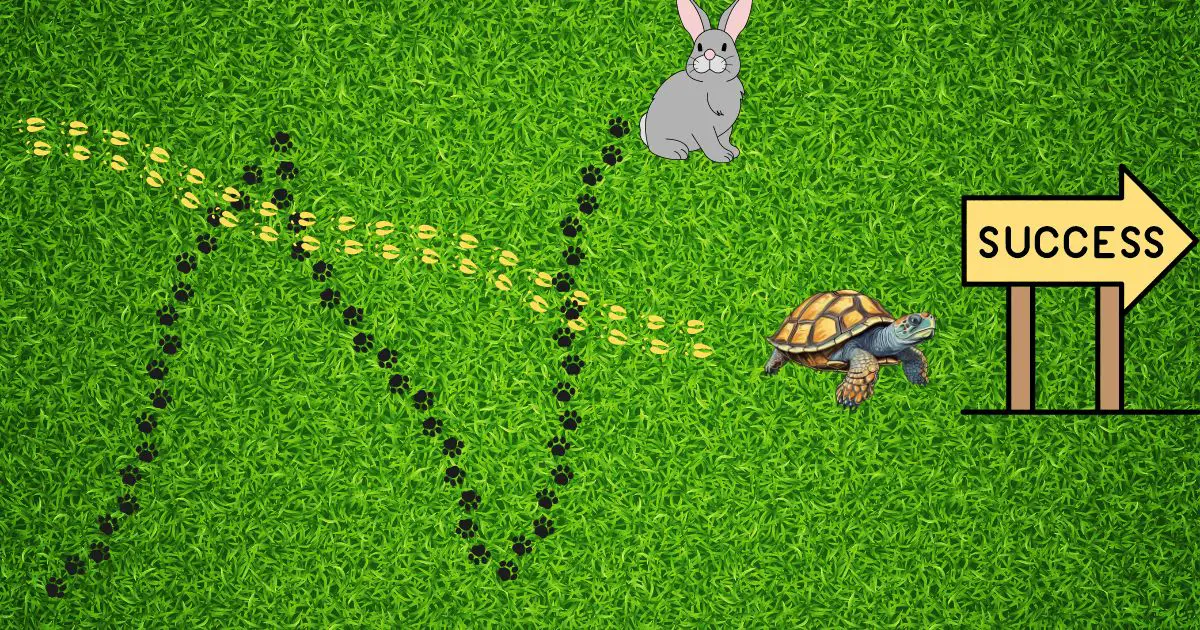Competing frequently is seen as a way to achieve success. Yet, for numerous individuals, always struggling with others in existence can result in powerful emotions of annoyance, unhappiness, and sorrow. The chase to be superior to the rest may appear like an inspiring trigger. However, it usually cultivates negativity and dissatisfaction, transforming self-improvement into a taxing competition instead of an appreciative voyage.
The Illusion of Fulfillment Through Competition
Often, when we compete with others, it gives us a false sense that if we do better than them then happiness or satisfaction will be ours. But in truth, this method leads to seeking approval from outside rather than feeling satisfied withim in ourselves.
When our aim becomes to excel over someone else’s achievements is not as important as the act of comparison itself and therefore attention is diverted away from enhancing oneself and growth. Consequently, the happiness from success disappears fast as it is linked with other people’s advancement instead of one’s feeling of accomplishment.
Always seeking approval from outside can make it very hard to feel satisfied. Even if you are the “winner” in a contest, such happiness does not last long. There will always be another person with whom you compare yourself, making an endless loop of discontentment. Instead of being content with where you are now, the desire to keep leading frequently causes exhaustion and sadness.

Competition Breeds Inaeosecurity
Comparing ourselves with others is primarily driven by insecurity. By evaluating our value based on how we compare to others, we strengthen the idea that we are insufficient. This mentality typically leads to anxiety, low self-confidence, and feelings of insufficiency. Every time someone else succeeds, it becomes a reflection of our own perceived shortcomings.
When we often see others’ lives, particularly in today’s world which is guided by social media, insecurity increases. Only the best parts of people’s lives are showcased on these platforms making us easy. We think that everyone else is doing better than we are. Nonetheless, this isn’t true. It’s only a misperception. The way things are showcased on the internet seldom paints the complete picture, and when we contrast our daily challenges with others’ carefully selected achievements, it invariably results in lower self-esteem.
This lack of confidence is not just emotionally tiring, but it drains mental strength too. When we concentrate on how other people are doing, the power that could be used for improving ourselves gets wasted in trying to show superiority or attempting to match someone else’s achievements. This unending comparison doesn’t only make individuals feel insufficient but also steals from them the happiness they can get from their unique growth.

The Trap of External Validation
Another crucial explanation for the misery caused by competing with others is dependence on approval from the outside. When your value as a person relies upon being “superior” to somebody else, individual satisfaction hinges on how other people view you. Instead of appreciating personal achievements, there could be doubts lingering in your mind like: “Is this sufficient?” or “What will others think?”
This method is harmful as it takes away the importance of individual accomplishments. No matter how much success one obtains, complete satisfaction cannot be reached if always compared to another person’s progress. Outside approval is temporary and what was once praised can lose its meaning fast when a new rival appears. The moment someone surpasses you, feelings of failure and inadequacy resurface.
Furthermore, depending on outside acceptance frequently results in harmful actions. There may be situations when you accept work or challenges that are not consistent with your beliefs or interests, just to stay on par with others. This mismatch between individual wants and outer anticipations could lead to internal strife and sadness because you’re living under the concept of success envisioned by someone else rather than yourself.
Constant Competition Limits Personal Growth
The process of personal growth is like a journey where you discover and improve yourself. But, when this path gets clouded by comparison with others, the true potential for self-development might get restricted. If you keep comparing yourself to others all the time, it will push you into a limited understanding of success that is generally influenced more by societal norms rather than your happiness or satisfaction.
For instance, a person may strive hard to get an advancement in their job. It’s not because it matches their long-term goals or gives them happiness. They do it due to expectations or maybe because one of their colleagues has been promoted recently. This method overlooks the reality that everyone has different paths for personal development. Something giving joy and fulfillment to someone might not give another individual the same feeling of achievement.
When you concentrate on surpassing others, there’s a chance of neglecting your abilities and interests. The development of oneself is about realizing what’s important to you, not the merits determined by societal norms or the people surrounding you. This urge for competition might hinder innovation, discovery, and the pursuit of goals that genuinely align with your personality.

The Emotional Toll of Constant Comparison
Going against others frequently has emotional costs. Emotions like envy, bitterness, and annoyance are regular consequences of always comparing oneself to other people. When your attention is centered on doing better than others, creating positive relationships becomes hard because competition stimulates negativity.
Instead of feeling joy for other people’s achievements, they are viewed as dangerous. Envy comes in, bringing unneeded tension and pressure on connections. In the long run, this may result in loneliness when bonds become masked by sentiments of competition rather than mutual help.
Also, the inside pressure to match with others can cause exhaustion. When the main aim in life is just to be on top, it gets tough to keep equilibrium. Working too much, ignoring your good health, and putting external targets before inner calmness can leave you feeling very tired emotionally. The ongoing strain of rivalry lessens the capacity to ease off and appreciate easy joys in life, making an endless cycle of tension and displeasure.
The Role of Self-Worth
A primary cause of feeling unhappy when you compete with others is that it diverts attention from your value. When your importance links to surpassing others, the sense of self may become delicate. If anyone exceeds you, it can seem as if they have reduced your worthiness.
The real value of oneself is born from the inside. It’s made on identifying your special skills, abilities, and contributions, not connected to how other people perform. If you stop comparing yourself with others, you can concentrate only on what truly is important for you. This change permits individual satisfaction since your objectives and accomplishments are founded on your principles, not on the anticipations of society.
Releasing competition doesn’t suggest abandoning desire or accomplishment. It implies reshaping achievement based on your standards. Instead of attempting to surpass others, concentrate on developing the finest version of yourself. This method gives you a high level of contentment because it lets you develop at your speed without the stress of making comparisons.

Reframing Success and Failure
In this globe where rivalry is predominant, people often view failure as a bad indication of one’s skills. But, if we only measure success by comparing it to others’ accomplishments, the important teachings provided by our failures might easily go unnoticed. When you compete against other individuals, the fear of not succeeding can occur because failing is seen as being unsuccessful in your quest to outdo someone else.
However, failure is a certain part of life and an important element for personal development. Rather than being afraid of failure, it should be accepted as a chance to learn and become better. When you cease to measure yourself against others, the concept of failing becomes less about losing to someone else and more about obtaining the understanding necessary for success in future endeavors.
If we relook success and failure in this manner, it provides stronger resilience. Life then becomes less about winning or losing and more about ongoing development. Changing the mindset not only decreases unhappiness linked with competition but also promotes a healthier, longer-lasting method for self-betterment.

In Short, Embrace Your Unique Journey
To compete with others might give motivation for a while, but usually, it results in unhappiness and dissatisfaction over time. Life is not about racing, and always comparing yourself to others steals away the happiness of your improvement. If you change your attention from rivalry to finding out more about yourself, deeper satisfaction and meaning can be developed in life.
Release the desire to surpass others, and instead focus on developing your unique potential. The true measure of success is not in comparison with those around you, but how well aligned you are with your values and objectives. By ceasing competition against others, doors open for genuine contentment, joyfulness, and tranquility.





